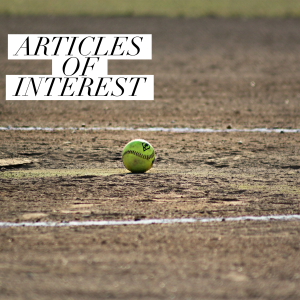Welcome to the January 2016 Edition of the PE Playbook. The PE Playbook is a review of blog posts over the past month that are specific to Physical Education or Youth Sport. Its about bringing these blog posts into a format that is easy to find, use and share. Hopefully this will result in more PE Teachers (and others) reading them and engaging with them. If you have any feedback about the presentation or content of the PE Playbook then please let me know in the comments section of this post or via @ImSporticus. Previous Editions of the PE Playbook can be found here.
Shane Pill, who is a lecturer in Physical Education Studies at Flinders University, blogs at Learning Through Sport. He may only post occasionally, but when he does it is (in my opinion) pure gold. His recent post What is being taught in Senior PE? A reflection on Cognitive “Information Processing” and Ecological “Dynamic Systems” skill acquisition theories shares research and practice on a skill acquisition theory from ecological psychology and dynamical systems theory. The combination of these ideas provides a theoretical framework for ecological dynamics, seeing the development of performance, skill acquisition and expertise in individual and teams as complex systems. This in turns provides a rationale for non-linear pedagogies such as a constraints based approach or game sense as a way of teaching sport. Two previous posts he has written How do we design our PE programs? which explores breadth vs. depth and The importance of Play in sport “skill” learning have greatly influenced my thinking with regards to content, curriculum design and delivery. I am grateful for his willingness to engage with teachers and the time he gives freely on twitter answering my many questions. It is gratefully received.
Shifting the Baseline: Thoughts on Mature Fitness by Sherri Spelic is a wonderful post that explores the opportunity of physical activity as we get older, and not what we are able to do, but what we want to do.
A Fine Balance by Andy Vasily asks us to question our own acculturation of physical activity and sporting experiences and whether we teach what we teach and the way we teach because of those experiences, or because it is the best for the children in our care.
Action Research Project – Student Movement by Mel Hamada is to me what all performance management models should have, action research projects for the individual that can help develop themselves and the pupils they teach, not just a set of metrics to be achieved.
Pondering Potential by Amanda Stanec shares her thoughts about activity and health promotion and whether promoting the benefits and potential of an active healthy lifestyle over the negatives of not engaging one might have a more powerful impact.
Sport Education in a Volleyball Academy class by Stephanie Melvyn is an excellent practical example of implementing a Sports Education Model and has given me some very good ideas to refine my approach. With so much research and evidence to back it up as a successful teaching approach to sport, why do not more PE Teachers use it?
Dear PE Teachers… and a follow up post to the response he received from many PE Teachers via @Positivteacha An English Teacher, who proposes that behaviour is a whole school issue. That as PE Teachers we should do more to promote and support this holistic approach to behaviour management through the withdrawal of playing school sport as a possible sanction.
What is Your Club’s D.N.A.? by Todd Beane via the Changing The Game Project website that asks what are the values, and what is the purpose of our club. These questions could be similar asked about school sport. What are your Do Not Alters?
Talent: A challenging concept that more than ever requires a more humanistic approach to support its emergence. by Mark O’Sullivan explores whether talent is a really a concept we should be talking about and promoting in youth sport. Perhaps we should be talking about learning and the willingness to learn, rather than other attributes that are more associated with ‘talent’?
The Philosophy of Science and Sport and Exercise Science by Dr Richard Bailey expertly and eloquently explores the questions: what is science, why does science matter for people working in sport, and can we tell ‘bad’ science from ‘good’? A long read, that will need to be digested several times, but well worth the effort.
Why I might banish football from PE entirely by Lee Andersen who proposes that pupils have plenty of opportunity to play football outside of the curriculum, we might consider dropping it from within the curriculum. Whilst I have a lot of sympathy for the arguments he puts forward, I don’t think it is something I can see myself doing within my context.
Confession of a PE Teacher: Breaking the mould via @BenBainesSLE challenges the stigma that is attached to being a teacher of PE and having to listen ‘to ultracrepidarian comments’ about our subject.
- What I left in PE?
- What I Learned During Recess Today
- Specialization…Is it the problem we think it is?
- Motivation, physical literacy and walking
- Why Teach Dance?
- Differentiation
- Fiddling While Rome is Burning
- Conventions: Why go?
- What would your one sentence be?
- Can Grit Be Addressed in #Physed?
- Getting to the Core of Great Teaching
- Don’t just pick on parents
- Protect your voice!
- Good Teaching is LIFE Reflection by Aaron Beagle
- Micro Actions – Macro Changes
- “Tomorrow gets me higher”
- The #PhysEdSummit 4.0 Conference Program
- Primary Energise – Wake up and Shake up your class in 2016!
- The Best Parts of My Week – 1/4/16–1/8/16
- The Best Parts of My Week – 1/11/16–1/15/16
- How to Teach Gymnastics Skills in PE
- The Best Parts of My Week – 1/19/16–1/22/16
- Gamification of PE – Level 2
- Have you ever seen this before?
- Strength Training: safe & essential for young athletes
- Teach Meet 2016
- The Best Warm Up for Tennis – In PE Lessons
- Using Mindmeister in #physed
- Using Technology in Physical Education
- The Impact of Screens on Children, and How to Encourage a Healthier Lifestyle
- Top Apps for PE Teachers – Part 43
- Read #physed blogs on the move
- GCSE PE League – how it has been received?
- Approval for AQA GCSE PE Specification
- PE across the curriculum: PE and Biology
- Join myPEexam.org
- Episode 47 – Simplify your Life with James Schramko
- Action Packed Warm Up – Grab their attention from the word go!
- Primary PE Assessment – A visual representation post levels
- Episode 48 – GPS & Physical Education
- Soccer in Siam
- 22 Questions to Help You Get to Know A New Athlete
- Thoughts on Chaos & Order
- 5 Simple Resolutions for Everyone
- Raising the Bar in Youth Sports
- 6 Characteristics of High Performance
- Per Göran Fahlström – One cannot shape and form children’s sports around small numbers and say that this is what the sport is all about
- I Found It Interesting #7 and I Found It Interesting #8 and I Found It Interesting #9
- How to Conduct a Successful Coach-Athlete Season Review
- Deliberate practice. Vital to your success in 2016.
- Three Pieces of Advice for the Strong Parent/Coach Relationship
- 1 v 1 Session Design – Why & how it went
- Poster Values vs. Practiced Values
- Managing obesity
- Q&A: When and how should young players start resistance training?
- Goal Setting for the Young Athlete
- How to do Goal Setting Right
- Decision making in complex environments
- Practice Saying ‘Yes.’
- Growth Mindset Reading List
- Phoebus moments
- Challenging Unhelpful Beliefs
- The Perfect Way To Wake Up
If that wasn’t enough reading for you then I highly recommend Simon Nainby’s Coaching Matters Round Up for January 2016 from his website Underground Athletics












Thanks for linking in my blog post – Growth Mindset Reading list in the Articles of Interest Section. I like this January 2016 edition. Lots of really useful content.
LikeLike
No problems Richard. You are writing some excellent posts. Your own about cricket, mindsets and learning still has me thinking, especially with the cricket season fast approaching. Keep up the excellent work.
LikeLike